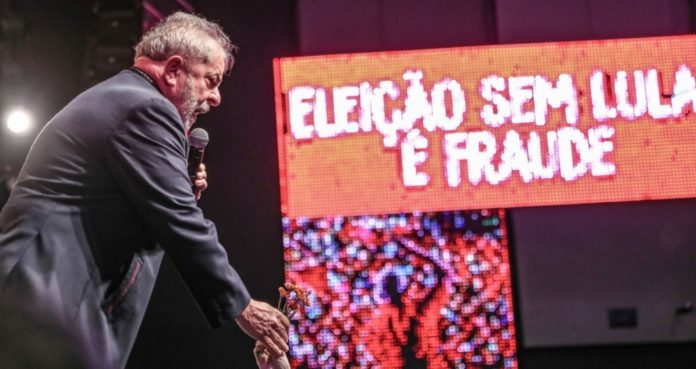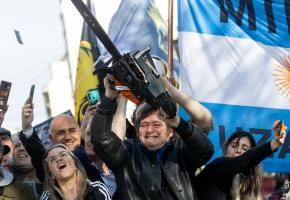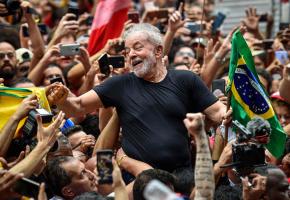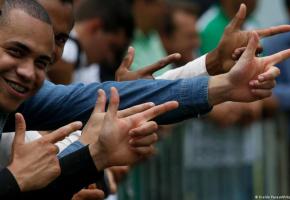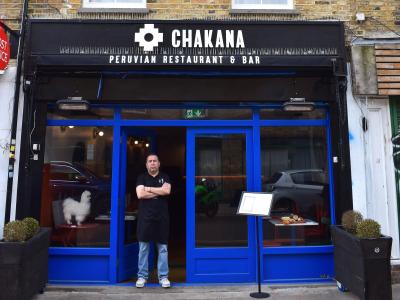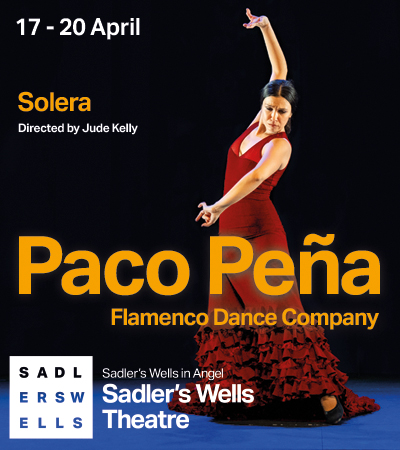Three judges at the appeals court in Porto Alegre voted unanimously on Wednesday to uphold the sentence that Lula was handed by a lower court, and increased the penalty from nine and a half years to 12 years and one month. The ruling prompted protests across Brazil, and protesters set fire to tyres and blocked streets in Porto Alegre and São Paulo.
Lula leads early polls for October’s presidential election, but the latest court decision means that he could be barred from running. The former union leader says he is innocent and the process is politically motivated to stop him from standing for an election. His supporters have called it an attack on democracy and Lula’s lawyers Cristiano Martins and Valeska Martins attacked the verdict and pledged to refer a complaint to the United Nations human rights committee.
“The whole process from the very beginning has been a legal farce masquerading as justice,” they said in a statement.
Lula served two mandates from 2003-2010, then helped his Workers’ party successor Dilma Rousseff win two more, before she was impeached for breaking budget rules in 2016 in a controversial process she denounced as a “coup”. She joined leftists and jurists across the world in attacking the legal proceedings against Lula. Even Diego Maradona posted a selfie on Facebook holding a Brazil team shirt with “LULA and 18”, captioned: “Dear Lula, Diego is with you.”
Lula was found guilty of receiving a seaside duplex apartment worth about £540,000 ($755,000) from a construction company called OAS. Prosecutors said the gift was part of a multibillion-dollar bribe scheme controlled by the former president at the state-run oil company Petrobras. Lula’s lawyers argued that he never owned the apartment and said they would appeal against the decision.
João Gebran Neto, the judge leading the verdict, placed the apartment into the wider context of the graft network, which cost Petrobras billions of dollars. “The defendant in truth was the guarantor of the bigger scheme, for which he acted behind the scenes, which aimed in a surreptitious way to increase the financing of parties,” he said.
The decision means Lula is legally ineligible to stand under a “clean slate” law, said Silvana Batini, a professor of electoral law at the Getúlio Vargas Foundation in Rio de Janeiro.
A Controversy That Will Not Disappear
In the build up to the trial, police and army personell had been patrolling the area around the courthouse for days and thousands of PT militants will no doubt today begin to converge on the city, travelling in 200 ‘caravans’ from all over the country. Nearly 200,000 have signed a petition in support of Lula’s right to stand as a candidate in the 2018 election, denouncing this ‘political’ trial. Demonstrations during and after the trial are planned in many other major cities by pro- and anti-Lula organisations.
As a committee to defend Lula and democracy launched in Porto Alegre, the mayor of Porto Alegre called on the armed forces to send troops, a request rejected by the defence minister as unnecessary. Meanwhile the court president flew to Brasilia to tell the head of the supreme court that the judges had received death threats. Who was making the threats was not revealed.
Lula resurrected the fact that the court president, Carlos Eduardo Thompson Flores Lenz, is a direct descendent of army colonel Tomas Flores who took part in the assault on Canudos in 1897 and was killed in battle. Canudos was the refuge of the sem terra (landless people) of the 1890s, and Lula asked if today’s Thompson Flores saw him as a citizen of Canudos and also wanted to stop his campaign.
In fact, Thompson Flores is not one of the three judges who will take part in the session when the appeal against Lula’s sentence by the lower court judge Sergio Moro will be heard.
No Proof?
Judge Moro’s guilty verdict, with a sentence of 9 years and 6 months, has been questioned, not only by Lula’s defence, but by many other judges and jurists, who point to the lack of proof that Lula owned the triplex apartment, alleged to have been given to him as a bribe. Moro failed to show the connection between the Petrobras contracts obtained by OAS, and the alleged bribe, in the form of the triplex.
In this video, Lula is speaking in September 2016 when Judge Moro first accepted the charges in this case. The accusation naming Lula was made by Leo Pinheiro, chairman of the engineering firm OAS, during a plea bargain negotiated while he was in prison, in order to reduce his sentence. Coincidentally, just a few days ago, another judge in Brasilia included the same triplex as surety in a debt claim against the OAS, using the property register where the owner is shown to be not Lula, nor any member of his family, but OAS.
Despite the verdict, Lula will win. There will be a huge outcry against what will be seen as a politically biased trial, and he will become Latin America’s most famous political prisoner. Lula’s lawyers are certain to appeal, and under the Brazilian system, there are several more layers of justice before the sentence is final. It is unlikely he would be actually imprisoned until that happens. What is not clear is whether he would be able to stand in the elections, which will almost certainly happen before the appeals could be heard. Experts have offered different opinions.
In addition, a further six cases are being brought against Lula, all equally flimsy, relying on circumstantial evidence and plea bargains, instead of hard evidence and concrete proof.
For many analysts, to stop Lula from running when he is clear favourite, would lead to major unrest and radicalization. Like economist Luiz Gonzaga Belluzzo, who said:
The biggest risk for the climate of the elections is if Lula is prevented from running. This would increase the virulence of the debate in the social media and in the streets -economist Luiz Gonzaga Belluzzo
If he wins, there will also be radicalization, but, Belluzzo says, Lula is a conciliator, if he is elected, he will reach out to his adversaries. “The big obstacle will be the market, if they transform him into public enemy No. 1. ….. they have no long-term vision, no interest in development.”
The oligarchy is afraid
At a rally in São Paulo this week which brought together artists, singers, rappers, intellectuals, student leaders, homeless and landless leaders, speaker after speaker said that to defend Lula’s right to stand in the election is to defend democracy. “The oligarchy is afraid,” said lawyer Fabio Konder Comparato, “that’s the reason for this trial.”
The charges brought against Lula were criticised at the rally as judicial persecution, judges practising politics, sentencing without proof. The date of the trial, 24 January was described as a ‘crossroads’ when the three judges would have the chance to bury ‘this judicial farce’.
When Lula spoke, he said that Brazil had been anesthetized after the coup which removed Dilma, as the PT was blamed for all the country’s problems. “Only now”, he said, “are people waking up”. He reminded his audience that under his government scores of federal universities and technical colleges had been opened, and thanks to quotas and student funding, thousands had had the chance to study. Millions had been lifted out of poverty.
What is at stake is national sovereignty, national pride. The elite want us to go back to having a vira lata (mongrel) complex. They don’t want poor, black people studying -Lula
An election without Lula is a fraudulent election, said Celso Amorim, former foreign minister. “to exclude Lula is to exclude the people”.
The problem for the centre and the right is that so far they have been unable to produce a viable candidate. Jair Bolsanaro, second in the polls, is a maverick, without any backing from a large political party. Emotions are running high, because the stakes are high.
This article was written by one of the experts at The Latin American Bureau. For more great articles on Latin America go to www.lab.org.uk


